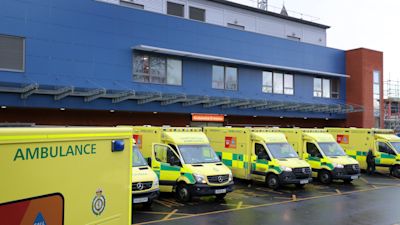Medway Maritime Hospital urges patients to use all available NHS services

Patients living in Medway are being urged to use all available NHS services, as Medway Maritime Hospital's Emergency Department (ED) is "extremely busy".
The trust says patients should consider "more appropriate and quicker options" available to them, instead of utilising ED.
It adds that by choosing wisely, it helps them "help you".
What other services can you use?
Urgent Treatment Centres
Urgent Treatment Centres
Urgent treatment centres (UTCs) are GP-led, open at least 12 hours a day, every day, offer appointments that can be booked through 111 or through a GP referral, and are equipped to diagnose and deal with many of the most common ailments people attend A&E for.
UTCs will also ease the pressure on hospitals, leaving other parts of the system free to treat the most serious cases. The UTC offer will result in decreased attendance at A&E, or, in co-located services offer the opportunity for streaming at the front door. All UTC services will be considered a Type 3 A&E.
GP Practice
GP Practice
A General Practitioner (GP) is your family doctor and is the main point of contact for general healthcare for NHS patients. All UK residents are entitled to the services of an NHS GP.
GPs are highly skilled doctors who support patients throughout their lives. They help you to manage your health and prevent illness and are trained in all aspects of general medicine. This includes child health, mental health, adult medicine, the diagnosis and management of acute medical and surgical problems and the management of long term health conditions.
GPs assess, diagnose, treat and manage illness. They carry out screening for some cancers and promote general health and wellbeing. GPs act as a patient’s advocate, supporting and representing a patient’s best interests to ensure they receive the best and most appropriate health and/or social care.
Pharmacy
Pharmacy
As qualified healthcare professionals, they can offer clinical advice and over-the-counter medicines for a range of minor illnesses, such as coughs, colds, sore throats, tummy trouble and aches and pains.
If symptoms suggest it's something more serious, pharmacists have the right training to make sure you get the help you need. For example they will tell you if you need to see a GP, nurse or other healthcare professional.
All pharmacists train for 5 years in the use of medicines. They are also trained in managing minor illnesses and providing health and wellbeing advice.
Many pharmacies are open until late and at weekends. You do not need an appointment.
Most pharmacies have a private consultation room where you can discuss issues with pharmacy staff without being overheard.
People are being asked to call 111, or go to Urgent Treatment Centres and Minor Injury Units which are equipped to deal with the most common ailments people attend ED for.
Many may not know this, but the 111 service can book appointments at many Urgent Treatment Centres - which can be done over the phone or through the online service.
The key message is: if your condition is not serious or life threatening, please consider an alternative to ED.